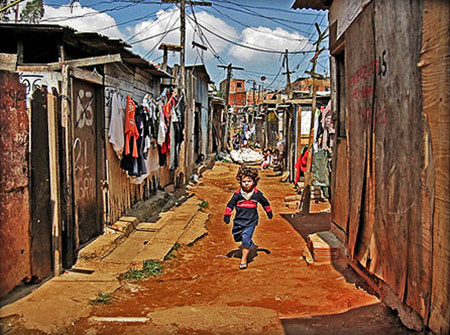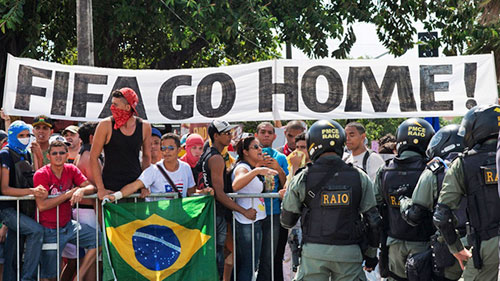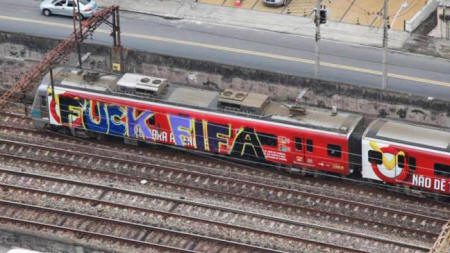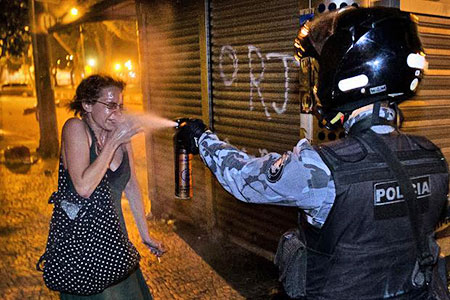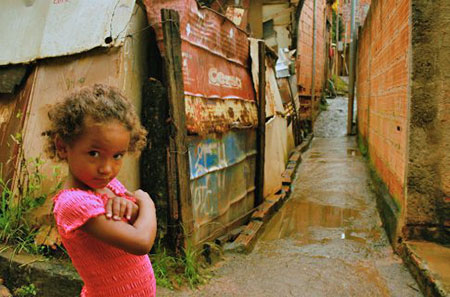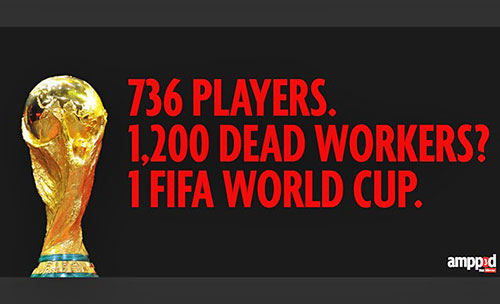|
|
|
2013-2014
has brought to light the social inequalities, injustices and class struggle in Brazil. In response to property speculation, gentrification, criminalization of the left and forceful removals, the "football crazy" country has seen the largest protests in the history of the championship. Below is a selection of articles covering the negative impacts of this years World Cup on the largest country in Latin America.
Sabrina Fernandes June 12, 2014
from
GlobalResearch Website
The answer is a World Cup for big capital, large
construction companies, property owners, and the elites who can access the
games and get perks that middle-class attendees cannot afford. It is
primarily a World Cup for FIFA, a private institution whose World Cup
dealings have been slowly exposed.
In the Brazilian case (and no doubt, to some extent, everywhere else where such events are held), the legacy is broken promises of improvement, capital and property speculation, dispossession, and the promotion of a constructed image of Brazilian culture that highlights the exotic and the stereotypical while it actively erases the social processes that make up the daily lives of Brazilians.
June 03, 2014
from
GlobalResearch Website
According to these analysts, 'class consciousness' was replaced by 'mass' consciousness. They argued that atomized individuals, manipulated by the mass media, were converted into passive consumers who identified with millionaire sports heroes, soap opera protagonists and film celebrities.
The culmination of this 'mystification' - mass distraction -were the 'world championships' watched by billions around the world and sponsored and financed by billionaire corporations:
Today, Brazil is the living refutation of this line of cultural-political analysis.
The biggest protests in the history of the World Cup have taken place in Brazil. The myth of the mass media spectacles mesmerizing the masses has been refuted - at least in present-day Brazil.
To understand why the mass spectacle has been a propaganda bust it is essential to understand the political and economic context in which it was launched, as well as the costs and benefits and the tactical planning of popular movements.
David Swanson May 01, 2014
from
DavidSwanson Website
In preparation Brazil is evicting 200,000 people from their homes, eliminating poor neighborhoods, defunding public services, investing in a militarized police and surveillance state, using slave and prison labor to build outrageous stadiums unlikely to be filled more than once, and "improving" a famous old stadium (the world's largest for 50 years) by removing over half the capacity in favor of luxury seats.
Meanwhile, popular protests and graffiti carry the message:
Brazil is just the latest in a string of nations that have chosen the glory of hosting mega sports events like the Olympics and World Cup despite the drawbacks.
And the author of Brazil's Dance With the Devil, Dave Zirin, makes a case that nations' governments don't see the drawbacks as drawbacks at all, that in fact they are the actual motivation.
Just as a storm or a war can be used as an excuse to strip away rights and concentrate wealth, so can the storm of sporting events that, coincidentally or not, have their origins in the preparation of nations for war-making.
Sabrina Fernandes February 20, 2014
from
GlobalResearch Website
In anticipation of the games and elections, social dissidence, particularly in urban spaces, has turned into a matter of national security.
The combination of media attacks, police brutality, and the rearrangement of the legal system to deal with criminal activity related to protests and social movements (organized or autonomous) suggests an incremental coordinated effort between the government and mainstream corporate media in Brazil to extend the criminalization of social movements to all groups and individuals who visibly demonstrate their opposition to the status quo.
Mike LaSusa 10 June 2014 from GlobalResearch Website
But the people wanted better public services - especially the majority that identify as non-white.
At a total cost of roughly $11 billion - and at least eight workers' lives - Brazil is hosting the most expensive World Cup in history.
Brazilians overwhelmingly supported bringing the event to their country when FIFA awarded them the honor in 2007, but a recent poll from DataFolha indicates that a majority of citizens now oppose it.
Controversy over Appalling Migrant Worker Conditions October 05, 2013
from
GlobalResearch Website
FIFA president
Sepp Blatter did so
disgracefully. He ignored outrageous exploitation foreign construction
workers face.
Doha hosts America's forward CENTCOM (US Central Command) headquarters. It's based at Al Udeid Air Base.
It's home
for 5,000 US forces. It's a hub for US Afghanistan and Iraq operations.
Qatar was instrumental in Obama's Libya war. Its special forces armed and
trained extremist Islamist militants. They included the CIA affiliated
Libyan Islamic Fighting Group (LIFG). They're ideologically allied with Al
Qaeda.
It doesn't matter. America uses Al Qaeda and likeminded organizations as enemies and allies. Qatar supports Obama's war on Syria. It helps recruit extremist fighters.
It provides funding, weapons and training. It's part of Washington's plan to oust Assad.
|


